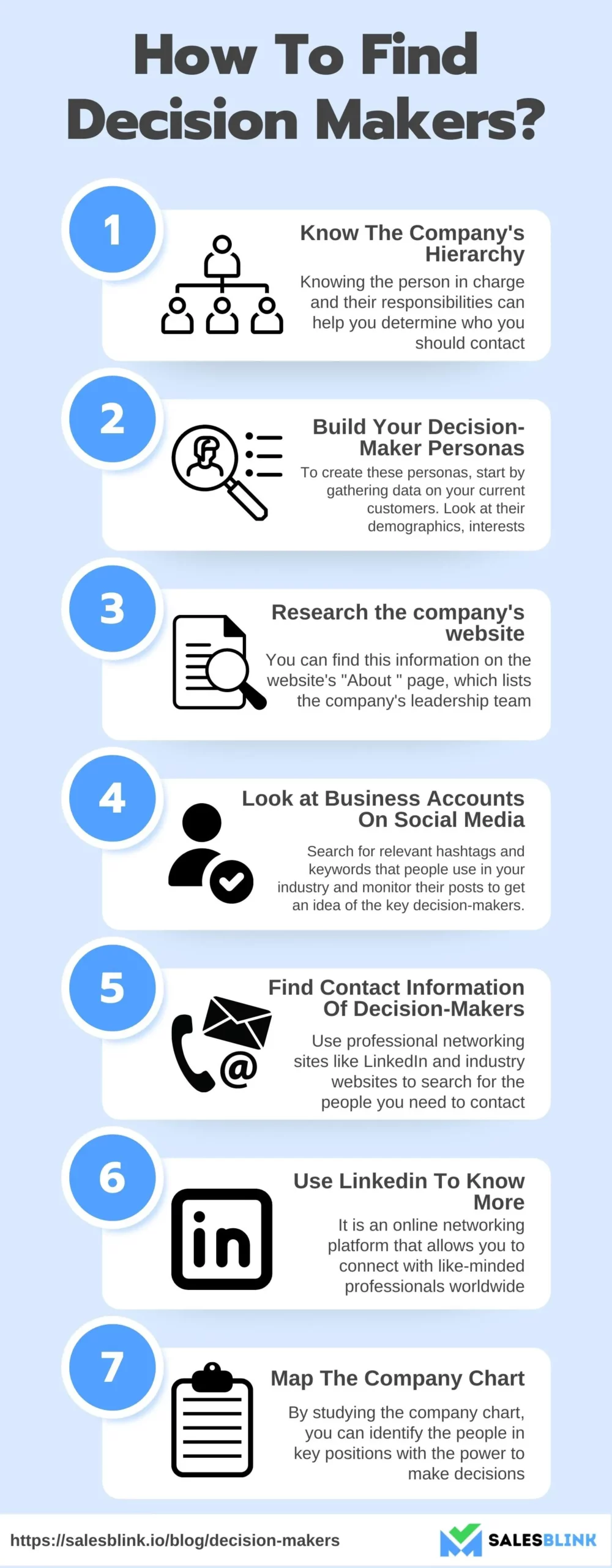How To Identify A Company’s Decision-Makers & Sell To Them?
Do you know that 34% of B2B buyers say their purchase decisions are driven most by features, while 27% say price and 39% say brand? (LoSasso) But that matters only if you get in touch with the right decision-makers in a company. And it can be one of the most challenging aspects of the sales process! How do you know who to contact, and do you even find these people in the first place? This blog post will answer these questions and more as we explore how to identify a company’s decision-makers and ensure you’re reaching out to the right people.
We’ll discuss the types of decision-makers, why they matter, and how to find them, with tips.
By following these tips, you’ll be able to quickly and efficiently identify the key decision-makers in any organization and start making connections that will help your business grow.
Table of Contents
Who Are The Decision Makers In A Company?
During the sales process, the decision maker can decide whether or not to make a purchase without seeking anyone else’s permission in the company. These people are at the top management level and sign on the dotted line whenever there is a purchase.
That was the definition of a decision-maker, but can you ask a person in a company whether he is the one deciding authority or not? Well, the downside of doing so is that you will make the other person feel insignificant if they are not a decision-maker. It is also worth noting that the first person you are meeting is definitely not the one who’s going to decide; they are usually a gatekeeper, and you have to give importance to them as well.
What Are The Types Of Decision Makers?
Here are the different types of company decision makers you will find,
1. Initiator
Initiators are the ones who take the initiative and are the ones responsible for proposing solutions and coming up with ideas to move the project forward. They may not have a high position in the company, but they possess the authority to make decisions.
2. Buyer
Buyers take the lead in the purchasing process and ensure the organization gets the best value for its money. They have the power to purchase, and when a rep works directly with them, they have a higher chance of closing the deal.
3. Decider
Deciders are the type of decision-makers in companies responsible for making key decisions that affect the organization’s direction. Their influence is more than that of buyers, and they are a part of deals related to acquisition and expansion.
4. Influencer
Influencers are an essential type of decision-makers in companies, as they have the power to influence the opinions and decisions of others. In addition, they have the required research abilities and resources to look at a decision.
5. Evaluator
Evaluators are responsible for evaluating a wide range of data to make informed decisions. In addition, they offer feedback even if a product is within their domain or not.
6. Advocate
Advocates offer support to project groups and lead their departments or causes. In case of a slowdown, they help get the workflow back to normal.
7. Gatekeeper
Gatekeepers are a type of decision-makers in companies who are responsible for screening, controlling, and influencing the flow of information. They can decide which projects should be allowed to move forward and which should not. You will find them in your first point of contact.
Why Decision-Makers Matter In Sales?
Decision-makers play an essential role in the sales process. These influential individuals are responsible for making the final purchasing decisions, and they have the power to make or break a sale. As such, salespeople must understand how to identify and engage with decision-makers.
Knowing who is making the decisions and their needs and wants can help salespeople tailor their pitches to meet the decision maker’s needs better.
A successful salesperson will also be able to build relationships with these key players so that they can be informed of the latest developments in the industry and be ready to act when the time comes.
By focusing on the decision-makers, salespeople can ensure that their offerings are well-received and increase their chances of success in the long run.
How To Find Decision-Makers In A Company?
Here are the steps you must follow to find decision-makers in a company,

1. Know The Company’s Hierarchy
When finding the decision-makers within a company, it’s essential to know its hierarchy. Knowing who is in charge and their responsibilities can help you determine who you should contact when you want to make a proposal or ask a question. The CEO is traditionally the highest-ranking decision-maker in a company, but other important roles like the COO, CFO, and directors are below them. It’s important to understand the role of each of these positions and how they fit into the company’s structure. Additionally, it would help if you familiarize yourself with additional titles that may signify decision-making authority within the company, such as department heads or project managers. Once you have a good understanding of the company’s hierarchy and its roles, you can easily pinpoint the people with the power to make decisions.
2. Build Your Decision-Maker Personas
Before you can effectively target decision-makers in your business, it is essential to understand who they are and what motivates them. Building decision-maker personas is a great way to do this.
To create these personas, start by gathering data on your current customers. Look at their demographics, interests, and preferences, and use this information to create a few key decision-maker personas. For example, do they prefer emails or phone calls? Do they respond better to visuals or statistics? These are the questions you should consider when creating your decision-maker personas. Once you clearly understand your target decision-makers, you can reach out to potential customers who fit your decision-maker personas. Understanding who your decision makers are is an important first step in finding success in the business world.
3. Research The Company’s Website
Researching the company’s website is a great way to determine any organization’s decision-makers. Typically, you can find this information on the website’s “About ” page, which lists the company’s leadership team. You can also search for the company’s executive profiles, which list key personnel names and job titles.
Furthermore, you can search the company’s press releases or look at its annual reports to find out who is leading the company. Finally, you can search through industry-specific websites or networking platforms to connect with people already in the know. By doing your research, you can identify the decision-makers in any organization and make sure they hear your voice.
4. Look at Business Accounts On Social Media
Social media is a powerful tool for businesses, and using it to find decision-makers can be a great way to get ahead. To find the decision makers in your industry, start by looking at the accounts of businesses in your industry on social media. You can also search for relevant hashtags and keywords that people use in your industry.
Once you find and follow these accounts, you can monitor their posts and get an idea of the key decision-makers. You can also start engaging with the decision-makers directly by commenting on their posts, liking their content, or even sending them a direct message. By building relationships with the right people, you can create valuable opportunities and open doors that may otherwise have been closed. With an effective social media strategy, you can gain access to decision-makers, learn more about them, and increase your chances of success.
5. Find Contact Information Of Decision-Makers
Finding the contact information of decision-makers can be a crucial step in achieving business success. You can use several strategies to find the contact information you need. First, you can use professional networking sites like LinkedIn and industry websites to search for the people you need to contact. You can also use search engines like Google to identify potential contacts. Additionally, you can attend industry events, conferences, and trade shows to meet people in person and get their contact information. Press releases, media reports, and other sources of information can provide you with leads you can follow up on.
These may be the manual ways of getting details of decision-makers. However, you can turn to automation and use different tools like LinkedIn Sales Navigator, Lusha etc. to find prospects’ email addresses through people search in a few seconds. This will save time and increase the sales team’s productivity.
6. Use Linkedin To Know More
LinkedIn is an invaluable tool for professionals looking to get ahead in their careers. It is an online networking platform that allows you to connect with like-minded professionals worldwide. It also provides an excellent opportunity to get to know the decision-makers in your field.
By searching for industry leaders and creating a list of contacts, you can build relationships with the people in your field. You can also join groups related to your industry or field of interest and follow industry-related news feeds to keep up to date on the latest developments. Knowing more about your industry’s decision-makers will help you make informed decisions and position yourself as an expert in your field.
7. Map The Company Chart
A company chart is a visual representation of the management structure, showing each individual’s hierarchy and roles. By studying the company chart, you can identify the people in key positions with the power to make decisions. It is also helpful to look for patterns in the structure, such as positions higher up in the hierarchy and those grouped together. This can provide clues about how the company makes decisions and who is involved in the process.
Tips To Help Find the Decision-Maker
Now that you know the steps to follow, it is good to know about the tips that will help you find the decision maker easily.
1. Reach out to decision makers later during the day
Reaching out to decision-makers later in the day can be beneficial for several reasons. For starters, decision-makers are likely to be less busy in the latter part of the day, so they may be more likely to read and respond to your message. Additionally, decision-makers are more likely to remember your message if you send it later in the day, as the day’s events are still fresh. Finally, reaching out to them later in the day shows that you will put in the extra effort to get their attention. This may give you an edge over other prospective contacts who sent their messages earlier in the day. All of these factors make it worthwhile to reach out to decision-makers later in the day.
2. Keep messages short

When trying to get in touch with a decision-maker, it is essential to keep messages short and to the point. This is because decision-makers often have a lot of emails and other messages to sift through, and they don’t have time to read long, drawn-out paragraphs. If a message is too long, they may not even read it. But if it’s concise, they are more likely to pay attention and consider what you have to say. Additionally, keeping messages short helps to ensure that your point is clear and easy to understand.
3. Use direct lines
Unlike cold calling or emailing, direct lines give you a chance to have a conversation with the person you need to talk to. You get direct lines through a company’s website or other online sources, such as LinkedIn. Once you have the direct line, you can call the decision-maker and introduce yourself and your company. This can effectively help you get their attention without the risk of being ignored or passed over.
4. Leverage referrals

Reaching out to decision-makers can be a daunting task, especially if you don’t have any personal connections. One effective way to break through the noise is to use referrals. Referrals are a great way to get the attention of key decision-makers in an organization. When someone you know personally, such as a friend or colleague, refers you to a decision-maker, it shows that you have won their trust and that you’re worth their time.
5. Use videos
Personalized videos in sales have become increasingly popular in recent years, and for a good reason. Videos can be powerful tools for connecting with customers and reaching out to decision-makers. In addition, for businesses that are trying to make an impression, a well-crafted video can be a great way to showcase their product or service in a memorable way.
6. Tailor your message to each decision-making persona

When dealing with decision-makers, it is important to tailor your message to the individual. Each decision-maker may have their own unique set of priorities and interests, so it’s essential to understand who you’re talking to craft a compelling message. Consider the decision-maker’s goals, values, and experience level, and adjust your message accordingly. Ensure you understand their perspective and address any concerns they may have. Additionally, it’s essential to keep your message clear and concise; try to avoid jargon or overly technical language.
7. Mention what your product can solve
Specifying how effective your product or service is in alleviating the target audience’s pain points is essential. Instead of boasting about its features, you have to focus on showing how it can benefit the end user. Everyone wants to know how your solution can improve their lives, so you must focus more on that while getting in touch with the deciding authority.
8. Ask the right questions

Before you discuss with decision-makers, take some time to think through the questions you want to ask. Here are some tips on how to ask the right qualifying questions:
- Identify the key decision-makers and their roles.
- Ask open-ended questions to encourage a deeper discussion.
- Ask questions that focus on understanding the problem and its implications.
- Avoid questions that the other person can answer with a simple yes or no.
- Make sure your questions are clear and easy to understand.
9. Be persistent
When trying to make progress in any situation, it is essential to be persistent. This means consistently and regularly following up with decision-makers to ensure your message is heard and understood. This could involve making phone calls, emailing, or even visiting their office in person. The key is to be polite and professional. Always remember that they are busy people with a lot on their plate. If possible, provide them with information that is clear and concise. If you don’t make a decision immediately, feel free to follow up and ask for an update. It will go a long way in helping you.
Tools To Find The Right Decision Makers
Here are the tools you need to find the right decision-makers,
1. Lusha
Lusha helps with the prospecting stage of the sales process, and you can find the contact details (email address & phone number) of decision-makers almost instantly. You can then run a campaign to reach out to them via cold email in the most seamless manner.
2. CRM Tools
The CRM tool you currently use helps you manage your existing and prospective clients. By looking at your existing customers, it will be easier for you to understand your ideal customer.
3. ZoomInfo
With ZoomInfo it is possible to get the direct phone numbers of a company’s decision-makers. It is an added advantage as opposed to most tools that only have email addresses to offer.
4. LinkedIn Sales Navigator
LinkedIn Sales Navigator is a B2B research tool and is quite effective when you want to know about decision-makers. It can definitely be the best tool you add to your toolkit.
Start Finding the Decision Makers & Seal More Deals
The ability to identify decision-makers is an important skill to have if you want to be successful in business. When you’re trying to score a meeting with a potential client, knowing who the decision-makers are and how to reach out to them effectively will help you get your ideas heard. By researching the company and its leadership, studying the organizational chart, and reaching out through the right channels, you can ensure that your message gets to the people that matter. Our inputs will help you in achieving business goals faster. Just remember to thank us when you start cracking deals.
FAQs
During the sales process, the decision-maker can decide whether or not to make a purchase without seeking anyone else’s permission in the company. These people are at the top management level and sign on the dotted line whenever there is a purchase.
The different types of decision-makers you will find in a company include Initiators, Buyers, Deciders, Influencers, Evaluators, Advocates, and Gatekeepers. So, you should know who to reach out.
To find a decision-maker, know the company’s hierarchy, build your decision-maker personas, research the company’s website, look at business accounts on social media, find contact information, use LinkedIn to know more, map the company chart.







